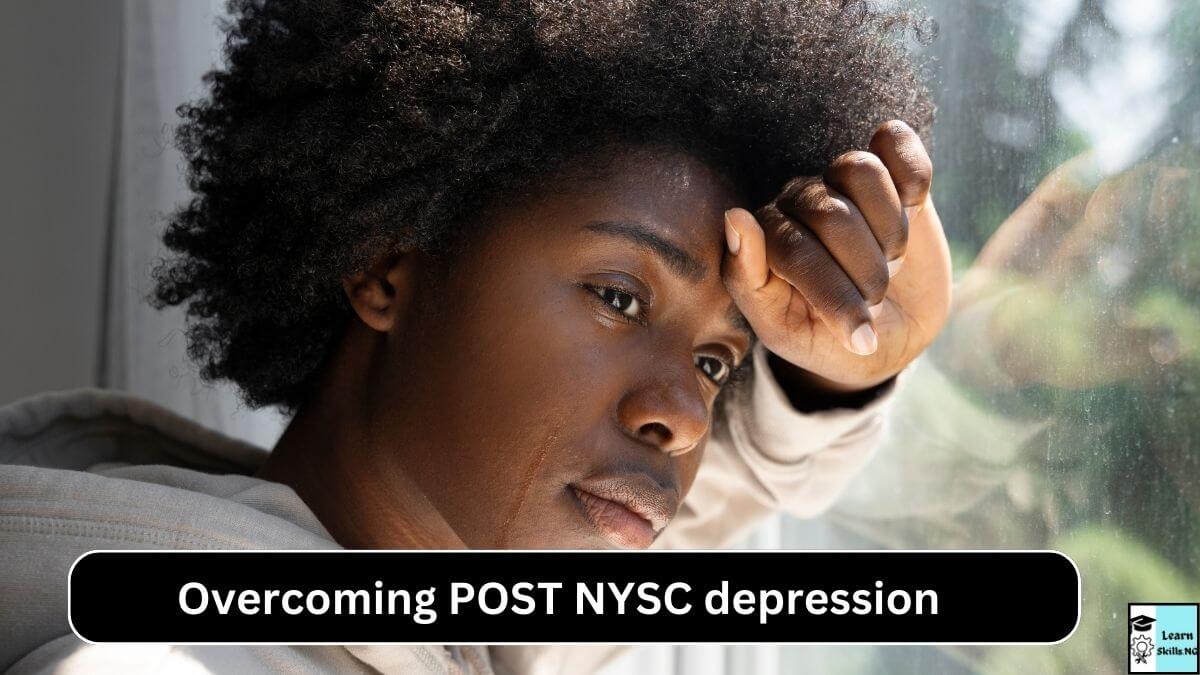Finishing your National Youth Service in Nigeria is usually a joyous event. Most young people soon realize after passing out that there are difficulties ahead.
The NYSC (National Youth Service Corps) is a compulsory one-year national service for young graduates in Nigeria. Young people are sent to other states of Nigeria, assigned to work in organizations, and receive a monthly allowance.
In this article, I will explore the challenges you would likely face after your youth service and the steps you can take to overcome them.
Is it compulsory to do your NYSC after graduation?
The short answer to this question is yes. According to the Nigerian constitution, all graduates of Nigerian higher institutions ( Universities, Polytechnics, or colleges of Education) are expected to partake in the program after graduating.
The only people exempted from the National Youth Service are people who meet any of these criteria.
- People over the age of thirty.
- People who served in the armed forces of the Federation or the Nigeria Police Force for more than nine months.
- People who were members of staff of any of the following;
- The Nigerian Security Organisation
- The State Security Service
- The National Intelligence Agency
- The Defence Intelligence Service
- Someone who has been conferred with any National Honour.
Disabled people can also be exempted from the National Youth Service.
Do you need NYSC to work in Nigeria?
Not all workers in Nigeria are graduates. Some people are employed with lower academic qualifications such as the SSCE certificate. Such people don’t need to present an NYSC discharge certificate.
However, when applying for a job, either in a state-owned or privately held organization that requires applicants to have graduated from a higher institution, you would need to present your NYSC certificate.
Challenges you might face after NYSC and what you should do about them
Most young graduates have faced harsh challenges after completing their NYSC programme successfully. What makes these challenges unique is that they come at a time when young people are still trying to figure out how to survive in the country.
You no longer receive an allowance from your parents or the federal government, you now have to cater for yourself, and you now have to do the impossible; get a good job in Nigeria. As if that isn’t bad enough, you have all this pressure from family and friends to give them money. It’s like the toughest phase of your life but let me paint a clearer picture of what you might be going through;
Challenge 1- Loneliness
After youth service, it soon starts to look like you are on your own. Your friends gradually stop keeping in touch and you start to feel abandoned, and lonely. This is a problem you shouldn’t overlook because networking with other young people like you has its unique benefits.
I have heard stories of young people who got jobs thanks to the timely intervention of friends. Some other people partner with friends to start a business. You can do a lot of great things as a recent graduate but you won’t do most of them alone.
What you should do
There are several ways to connect with friends and other young people. Some of them are;
- Connect with friends on social media like Facebook and WhatsApp
- Join your school’s alumni community.
- Create a professional profile on Linkedin and connect with people a few years ahead of you.
- Connect with forward-looking young people in your local community you can do this by attending religious or social events like weddings, church or mosque programmes, etc
- Attend professional webinars and seminars.
Challenge 2- Unemployment
This is the elephant in the room. Almost every graduate wants to be gainfully employed. It would not work out for most people at least for the first few years after National service. But that doesn’t mean you should put your life on hold while waiting for a great job to fall into your lap.
Remember you have bills, responsibilities, a future to build, and a limited amount of time to achieve financial milestones. Starting your life requires a more proactive approach.
What you should do
If you are in search of a job, here are a few steps you might want to take;
- Learn basic skills that boost your employability like Microsoft Excel, Word, PowerPoint, Projects, Google Workspace, digital marketing, etc
- Create your CV and Resume. Ensure it looks professional and highlights your skills and work experience.
- Start a small business to fund your job search. Remember, searching for a job can incur some costs like transport fare, Job boards, and costs associated with registration like internet, and printing. You can start a small business like trading, freelancing, or any other business that you find suitable to fund these things even if you have little capital.
- Sign up to Job boards like Jobberman, grabjobs, Delon jobs, careers24, etc. This would help you stay informed on new job openings. Be sure to apply as soon as you see an opening that you are suited to fill.
- Create a professional profile on LinkedIn and create alerts for the types of jobs you are interested in. You can also use LinkedIn to connect with professionals who can mentor you and help you start your career.
Challenge 3- Accommodation
Job opportunities are more common in some parts of the country than others. Most job searchers would tell you that Job openings are found in Lagos and Abuja more than in any other part of the country. This means that if you don’t live in any of these places you might need to relocate.
The problem is- where do you stay after arriving in these places? Accommodation in these places is more expensive than in any other part of the country.
What you should do
Getting accommodation depends on several factors such as your financial capacity, family background, personal preferences, etc. But here are a few options you might have;
- Stay with family relations in these cities
- Stay with friends already living in these cities. You can agree to split the bill with your friends.
- Get a job that comes with accommodation. You are more likely to get a low-paying job like cooking, security, or similar jobs with accommodation. If you are okay with this then you should apply.
- Get people to share your rent with. If you have some money but need a co-tenant to complete it, you can check out ulospaces. You can find other people looking for co-tenants. Check if you are fine staying and sharing rent with these people and take advantage of this if you are.
- Get accommodation through your religious organization or club.
Challenge 4- Deciding on the next step
Yes. Many people don’t even know where to start after NYSC. That is why some never do. Deciding what to do next, especially if you have never thought about it before can be tough.
If you think about it for too long without coming up with anything productive you can fall into depression. Thoughts suggesting you are failing in life or lagging behind start to creep in. If you find yourself in such a situation you aren’t alone.
What you should do
There are a few things you can do to achieve clarity;
- Get a mentor. You can meet with successful people in your community you respect and admire. Present gifts to them and ask them for mentorship. Then you can ask questions.
- Connect with successful colleagues and acquaintances who finished their youth service a few years ahead of you and ask for advice.
- Keep a journal where you record any good advice or ideas you might have while trying to figure out your next step.
- Stay current. Read newspapers, magazines, and blogs like this one (Learnskills.ng) to understand the trend. You might get some good ideas while doing this.
Challenge 5- Pressure from family members
It is normal for parents and other family members to have certain expectations from you as a graduate. At least, they expect you to move out on your own and fend for yourself.
This is usually not a problem but in most cases, family members get uncomfortable when it seems you are doing nothing with your life or when they just can’t see what you are doing. The result of this is nagging, complaints, and sometimes harsh treatment from family members.
What you should do
There are a few things you can do about this;
- Discuss your goals with family members and give them timelines for when you plan to hit your target. Ask them for support in achieving your goals.
- Start contributing to the family’s income. You can join the family business if there is one. Support parents or siblings in performing their vocation or trade. If you have a small business of your own, you can simply provide financial support towards covering bills and other expenses.
What you should do immediately after NYSC
If I were to give you a to-do list of activities immediately after NYSC it would include the following;
- Prepare your CV for Job applications.
- Create a professional LinkedIn profile.
- Enroll in a skill acquisition programme
- Get an address book and fill it with the names and contact details of your newly made friends and acquaintances.
- Get a smartphone
- Sign up on Job boards and create Job alerts on Google and LinkedIn
Can you use your NYSC as part of your work experience?
The short answer is it depends. If your activities during NYSC are relevant to the job you are applying for then of course you can. For example, if you have taught classes during your youth service, you can highlight this while applying for a teaching or lecturing position.
What business can I start after NYSC?
There are so many businesses you can start after your NYSC but we have highlighted the best businesses you can start with small capital in Nigeria. Kindly check it out.
Starting a business depends on your skills, interests, financial capacity, and economic factors. It is advisable to create a business plan before venturing into any business.
Determine how you would raise capital, manage operations, and implement a marketing strategy. Being clear about this from the beginning would help you solve likely business problems when you eventually start.
Conclusion
In a country plagued with harsh economic conditions, insecurity, and poverty finishing your National Youth Service means having to face these hardships by yourself. The thought of this alone can cause anxiety and fear in any young person.
In this article, several tips have been given to enable you to navigate these challenges successfully.










